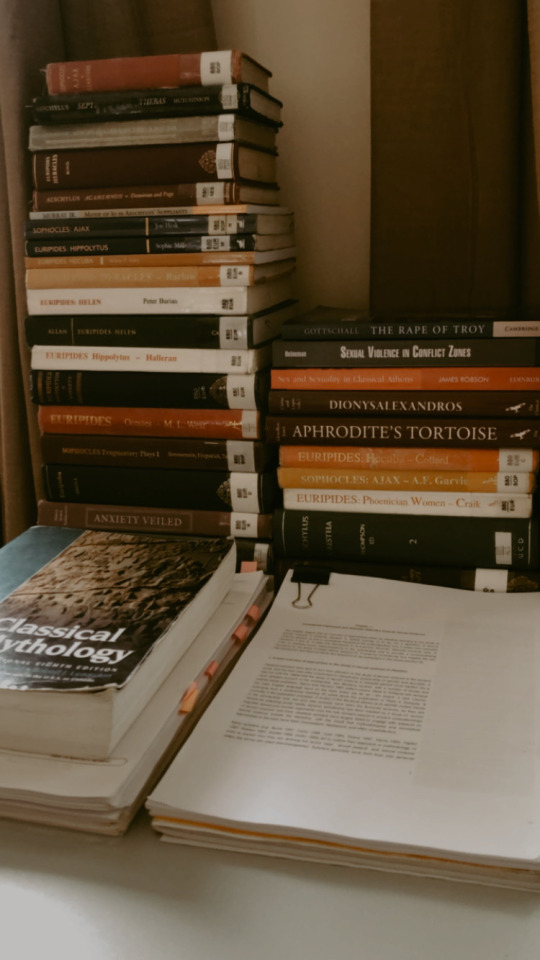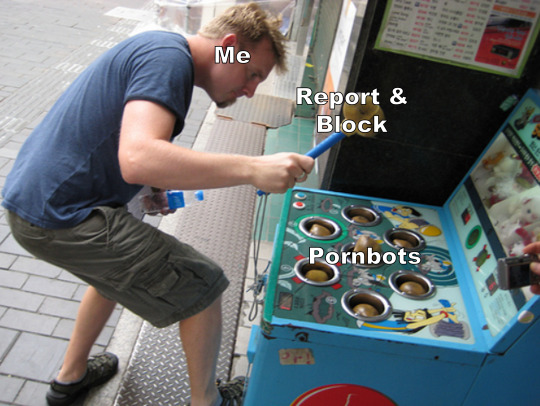Ziona my inbox is open~ Follows from @handsupanddropthepotato
Last active 3 hours ago
Don't wanna be here? Send us removal request.
Note
Can you recommend me some books in English or French? I would like to improve that languages. Have a good day and I hope that you do very well in your life and in your thesis! Greetings from Mexico!!💕
Hey :) thank you ! yes! Of course it also always depends what kind of books you like and on which level of your target languages you are, so keep that in mind. I also always recommend reading books that you like and have already read in your native language. For example my first English book was Harry Potter! The first ones are really easy to read, so if you’re into that, maybe try them in English or in French. Here are a few other recommendations:
English books: Young Adult Fiction:
-everything from John Green, e.g. The fault in our stars, looking for alaska, Paper Town
-Simon vs the homosapiens agenda - Becky Albertalli
-To all the boys I loved before (haven’t read it, only saw the movie,but I think it’s good!) - Jenny Han
-Holes - Louis Sacher
classics: (ones that are not too long)
The old man and the sea - Ernest Hemingway
Treasure Island - Robert Louis Stevenson
Lord of the Flies - William Golding
The Hobbit - J.R.R. Tolkien
Animal Farm - George Orwell
Roal Dahl also wrote some children’s books, I haven’t read any of them yet. But I know the movies for Matilda and Charlie and the chocolate factory. and I really like the stories!
some contemporary books:
Life of Pi -Yann Martel, The Help - Kathryn Stocket, The Martian - Andy Weir, crime books by Michael Robotham
French books: (I read some of them in school and they were easy to understand and I liked them!)
35 kilos d’espoir - Anna Gavalda
Je voudrais que quelqu’un m’attendre quelque part - Anna Gavalda (short stories)
Monsieur Ibrahim et les fleurs du Coran - Eric-Emmanuel Schmitt
Le Petit Prince - Antoine de Saint-Exupéry
Antéchrista - Amélie Nothomb
Un secret - Phillipe Grimbert
No et moi - Delphine de Vigan
I also enjoy reading books by Guillaume Musso, for example L’instant présent, La fille de Brooklyn, Central Park, Demain
Here is also a post I reblogged a few days ago made by @thefrancophile with some other book recommendations.
Hope this helps! Have a good day/night! Greetings back to Mexico!!
Also if any of my followers has some book recommendations, tell us!! For beginner/ intermediate levels of English/ French or just because you loved a book and want to tell others. I’m always happy to get book recommendations!
121 notes
·
View notes
Text
Masterlist for learning languages
Brick-by-brick language learning challenge
Best language learning tips & masterlists from other bloggers I’ve come across
my tips for a language study plan
topics for new vocabulary
how to find a language partner
my tips for how to practice writing in your target language
Recommendations for Learning Languages & Other Stuff
Learning a language = learning a culture
Vocab list templates: #1, #2, #3
Some easy Fantasy books to read in your target language
Language Learning Tips: #1, #2
6 tips for learning languages
App for organizing your language-learning (and anything else): Trello
Apps i use to learn languages
|
Requests / Asks:
-> you can find all my answered asks by searching for #ask, #ask response or #request
Indo-European Language Families
Improving your vocab
German infinitive & when to use it
English word order
How to find a language learning partner
Changing a game to your target language & "harmful" learning strategies
Can you get away with just using "das" the majority of the time in Germany?
Do you have any tips on how to improve your writing in your target language?
Do you have any resources/methods about how to reach an academic level in the language you’re learning (& how to improve your writing)?
Do you have any linguistic recourses on Ruhrpott-Deutsch?
4K notes
·
View notes
Text
every once in a while my notifications blow up just because of that one post and I’m like. Ah yes, it’s that time of the year again, where langblrs all suddenly reblog that langblr ask post😂
11 notes
·
View notes
Text
Best language learning tips & masterlists from other bloggers I’ve come across
(these posts are not my own!)
THE HOLY GRAIL of language learning (-> seriously tho, this is the BEST thing I’ve ever come across)
Tips:
Some language learning exercises and tips
20 Favorite Language Learning Tips
what should you be reading to maximize your language learning?
tips for learning a language (things i wish i knew before i started)
language learning and langblr tips
Tips on how to read in your target language for longer periods of time
Tips and inspiration from Fluent in 3 months by Benny Lewis
Tips for learning a sign language
Tips for relearning your second first language
How to:
how to self teach a new language
learning a language: how to
learning languages and how to make it fun
how to study languages
how to practice speaking in a foreign language
how to learn a language when you don’t know where to start
how to make a schedule for language learning
How to keep track of learning more than one language at the same time
Masterposts:
Language Study Master Post
Swedish Resources Masterpost
French Resouces Masterpost
Italian Resources Masterpost
Resource List for Learning German
Challenges:
Language-Sanctuary Langblr Challenge
language learning checkerboard challenge
Word lists:
2+ months of language learning prompts
list of words you need to know in your target language, in 3 levels
Other stuff:
bullet journal dedicated to language learning
over 400 language related youtube channels in 50+ languages
TED talks about language (learning)
Learning the Alien Languages of Star Trek
.
Feel free to reblog and add your own lists / masterlists!
17K notes
·
View notes
Text



indoor workspace, after a summer of working outside
3K notes
·
View notes
Text
how to speak any language fluently

Today I wanted to share with you some tips that you can apply to every language, but I experimented with them all personally to effectively improve my speaking skills in English
slow down:
A common problem among learners can be to speak too quickly. But rushing your words can often lead to confusion and miscommunication, so try to slow down and keep what you say simple
In the beginning, you may sound robotic, but you can speed up with time, once you feel more confident
work on emphasis:
The same sentence, said with different emphasis has very different meanings. Think about the point you want to make and use emphasis where needed to help clarify your meaning
Pro tip: take a sentence from a video or a show you like and repeat it out loud stressing each time a different word of the sentence!
keep going:
If you make a mistake, keep going. Understand that very few people, even native speakers, speak the language flawlessly and we all make mistakes
If you get embarrassed or shy once you’ve made a mistake, this is probably what people will notice, not the mistake itself! So keep going!
practice makes perfect:
There are so many options that now can help you improve your speaking skills without problems!
The best thing is recording voice notes when doing language exchanges, or recording yourself longer notes to receive feedback from other learners or natives on language learning apps!
736 notes
·
View notes
Text
every once in a while my notifications blow up just because of that one post and I’m like. Ah yes, it’s that time of the year again, where langblrs all suddenly reblog that langblr ask post😂
11 notes
·
View notes
Text
Teaching French to English Speakers:
French lesson: The word "sur" means "on" English speaker: Okay. French lesson: For example, The vase is [on] the table. The house is [on] the right. I read this book [on] his recommendation. Bring me the file [on] copyright licensing. English speaker: Right. Got it. "Sur" means "on."
.
Teaching French to Chinese speakers:
French lesson: The word "sur" means "on." Chinese speaker: Okay. French lesson: For example, The vase is [on] the table Chinese speaker: Right. Got it. "Sur" means "on." French lesson: The word "sur" also means "towards." Chinese speaker: Eh? French lesson: For example, The house is [towards] the right. Chinese speaker: Oh...kay. French lesson: The word "sur" also means "because of." Chinese speaker: What? H..how? What? French lesson: For example, I read this book [because of] his recommendation. Chinese speaker: Why does this one word mean all these things? Don't y'all have any other words? French lesson: The word "sur" also means "containing information pertaining to." Chinese speaker: Stop fucking around with me. French lesson: For example, Bring me the file [containing information pertaining to] copyright licensing. Chinese speaker: What the fuck is wrong with this language?
18K notes
·
View notes
Text
Spices in Chinese

In my totally unbiased opinion, one of the best things about learning Chinese has been learning about Chinese food culture. Chinese food uses a dizzying array of spices, but these are the most common that you'll see in recipes. Learning these words might even help you find your way around your local Asian grocery store!
The Basics:
鹽 (yán): salt 糖 (táng): sugar - Not technically spices, but salt and sugar are essential seasonings in Chinese cooking. Sugar is often used to provide balance in savory dishes, especially in the food of certain regions such as Shanghai. 味精 (wèijīng): MSG -MSG is also a common ingredient (but not really a spice), and not associated with the same racist health panic as in the US. Some chefs, however, see it as "cheating" and prefer to impart umami through traditional ingredients like dried mushrooms and high-quality stock. 粉 (fěn)/面 (miàn): powder - These two words can be stuck to the end of the spices below to indicate that they are ground instead of whole.
Spice Mixes:
五香粉 (wǔxiāngfěn): five-spice powder - A sweet-and-savory spice mix well known around the world, five-spice powder tends to include star anise, Sichuan peppercorn, cinnamon, fennel and cloves. 咖哩粉 (gālífěn): curry powder - British colonization brought curry to Hong Kong, where it's popular with beef or fish balls. 燒烤料 (shāokǎoliào): barbecue spice mix - This doesn't refer to char siu, but to the spicy grilled meat skewers that are popular across China. A typical version hailing from the north-west is based on cumin and chili powder.
Spices:
胡椒 (hújiāo): pepper - Chinese makes use of both white pepper (白胡椒) and black pepper (黑胡椒), but white pepper is more common. 花椒 (huājiāo): Sichuan peppercorn - This is the spice that gives Sichuan food its famous numbing quality, though it is used all across China as well. It comes in red or green varieties, and can be used fresh or dried. 辣椒 (làjiāo): chili pepper - Spicy food is popular in Sichuan and the rest of China's southwest, where tons of chili varieties are used fresh and dry-- this alone could be material for an entire vocab list. 八角 (bājiǎo): star anise - One of the most iconic spices in Chinese cuisine, its name literally means "eight horns". It's commonly tossed into stews and braises. 肉桂 (ròuguì)/桂皮 (guìpí): cinnamon - The cinnamon commonly used in Chinese cuisine is in fact cassia, which is stronger-flavored but less aromatic. 丁香 (dīngxiāng): clove - A key ingredient in five-spice powder and occasionally tossed into braises. Interestingly, many of the sweet spices that we associate with desserts in the US are not commonly used as such in Asia. A friend once told me that many Taiwanese people don't like cinnamon desserts because they find the taste medicinal. 茴香 (huíxiāng): anise seed - This spice is featured in Lu Xun's story Kong Yiji, where Kong Yiji asks the young narrator if he can write the character 茴, which is used in the name of the tavern's peas with anise. 香葉 (xiāngyè): bay leaf - Bay leaves are used in China in much the same way as in the US-- tossed into stews and braises to provide a little... well, nobody knows what a bay leaf tastes like but it must be doing something. 陳皮 (chénpí): aged tangerine peel - American-Chinese classics like orange chicken are likely influenced by stir-fries made with this bitter and fragrant peel. 百荳蔻 (báidòukòu): white cardamom - Chinese food doesn't use the green cardamom commonly used in Indian food, instead preferring to use white cardamom in braised dishes. 草果 (cǎoguǒ): black cardamom, tsao-ko - Black cardamom is dried over a fire, giving it a distinctive smoky flavor. While not overly common in much of China, it is one of the most common seasonings used in Yunnan food. 孜然 (zīrán): cumin - Cumin is also not a flavor commonly associated with China, but it's iconic of the food of China's northwest, such as Shaanxi and Xinjiang. 甘草 (gāncǎo): licorice root 沙姜 (shājiāng); sand ginger 當歸 (dāngguī): angelica root - These three spices are all known for their uses in traditional Chinese medicine, but are also used in medicinal soups and larger spice mixes. There are, of course, way more TCM herbs and spices used in Chinese cooking, but these are the most common to see in recipes or dishes.
172 notes
·
View notes
Text
resource for you french learners out there: manga scans in french!
37 notes
·
View notes
Text
I'm an ESL teacher, and I just want to say to anyone learning English, or any second language, who worries about sounding just like a native speaker- some of the most artistic, interesting, thought-provoking, and just downright cool/fun English turns of phrase that I have seen have come from non-native speakers constructing sentences in a way that native English speakers would never think to.
I worked with an older man from China once, reviewing the poem he had written. Not only was it a breathtakingly beautiful poem in its sentiment and imagery, but the way he used the English language to express this sentiment and imagery in the lines and verses was constructed in a way that I don't think a native speaker would ever have come up with. None of the unconventional phrasing impeded my ability to understand the poem, and what he regarded as 'errors,' I saw as a vital artistic element to the prose. I told him even that while I can tell him what a native speaker would say insofar as word order, etc., I honestly thought it would take something away from the poem rather than add to it if he wanted to alter his work. His phrasing was creative in a way that brought something new and beautiful to the art form.
I've had similar thoughts of stories I've read, songs I've heard, conversations I've had, and more.
Please don't be discouraged on your journey to learning any language. And know this, especially coming from an intensely monolingual culture in the US and with the global presence of English, your version of English is just as real and authentic as native speakers' English. You have value to add to any conversation, you have value to add to art and science and anything in between. Your choice of words and phrasing is a worthy contribution to any social, professional, and/or artistic scenario, regardless of how close you sound to a native speaker. The unique variety of English you bring from the influence of your native language(s) and personal idiosyncrasies add to the English language, they do not subtract from it. It brings new words, new cultural expressions and phenomena, new ideas, new art, new slang, new curse words/phrases, new jokes, new terms of endearment and phrases of comfort, and so much more. Language is a beautiful, ever-shifting, ever-evolving entity. All of its permutations merit respect and celebration. So, in all honesty, thank you for sharing your own unique flavor of English with the rest of the world. We are richer for it.
TL;DR - there is no singular correct way to speak a language, and the influence of other cultures and languages on English spoken by non-native speakers is awesome and enriches all of us. Be proud of your unique expression of the English language.
308 notes
·
View notes


















